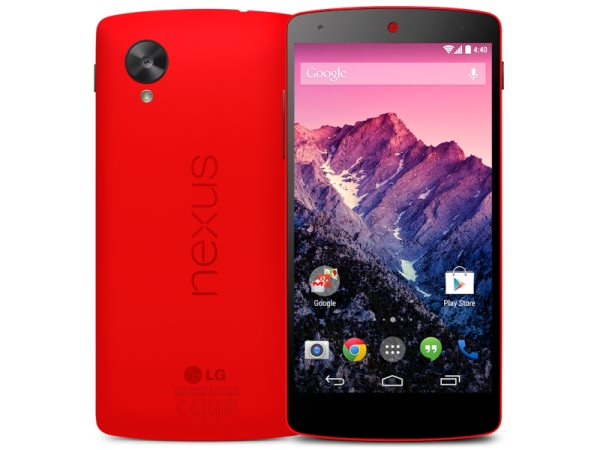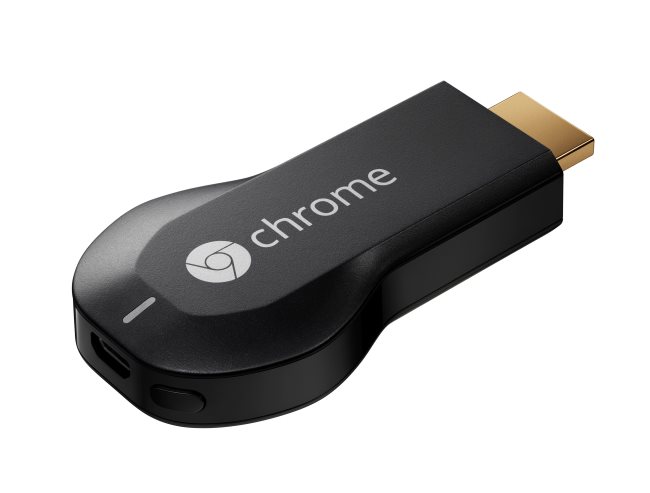
Google Maps will help you get lucky this Valentine's Day -- lucky in love
Ah, Valentine's Day...a day of love. Just mentioning the holiday conjures images of heart-shaped candy boxes, flowers and holding hands. Yes, it is a grand day for all that have a significant other. But, for single people, it can be quite depressing.
For those of us fortunate enough to have a significant other, the love and happiness is rivaled only by anxiety. You see, getting the right gift and making a reservation at the right restaurant can be quite daunting. You only have one opportunity to succeed each year on Valentine's Day. Failure may result in certain doom. Google however, has your back. The search giant has some great suggestions for having a romantic day, powered by Google Maps.

1 billion smartphones ship in 2013, Android and iOS still dominate
According to figures released by International Data Corporation (IDC), 2013 was the year that smartphones really took off -- a staggering 1 billion units shipped. As has been the case for some time, it is Android and iOS that continue to dominate, with Google's mobile operating system claiming a 78.1 percent market share, and Apple's 17.6 percent. As has been the norm, Windows Phone found itself in third place, although it did manage to increase its market share to 3 percent.
The figures are based on shipments in the fourth quarter of 2013, and when compared to the same period in 2012, Android and Windows Phone both made gains while iOS lost some of its market share. Jumping from 70.3 percent of the market in 2012, Android's growth was impressive, while iOS dropped 3.3 percentage points from 20.9 percent. Looked at in terms of percentage points, Windows Phone's jump from 2.6 to 3.0 percent of the market, it still represents an improvement of more than 13 percent.

Google and VMware join forces to bring Windows apps to Chromebook via the cloud
Chromebooks may be increasing in popularity, particularly in business, but they still have a long way to go before they catch up with Windows-based laptops. One of the factors holding back Chromebook is, both obviously and ironically, Chrome OS. It is a perfectly capable operating system for anyone locked into the Google ecosystem, but it has one failing -- for many people, at least -- it will not run Windows applications. But all this is set to change thanks to a new venture between Google and VMware.
VWmare is a name long-associated with bringing one platform's apps to another using virtualization, and now it is pushing its DaaS platform (or VMware Horizon Desktop as a Service Platform for Service Providers to give it its full, unabridged title) as a way to bring Windows applications to Chromebook users. As this is something that will be available on a subscription basis, it is likely to appeal to businesses rather than individuals, but it does break down another obstacle for anyone with two minds about Chromebook.

Translate any English text on your display with Screen Translator
Translation services from Google, Bing and others mean it's now very easy to translate plain text, and there are a host of apps and browser extensions available to simplify the process further. Translating text embedded in an image requires a little more work, but Screen Translator is an open source tool which may be able to help.
Installation is trickier than it should be, thanks to a setup program which lists some options in English, others in Cyrillic. It's not the most impressive start, but choose to install everything (which is safe, there's no adware here) and setup proceeds with no other problems.

Who's your daddy? Google voice dialling lets you call and text family with ease
You know how sometimes it just seem like too much hassle to scroll through your contact list to place a call or send a text to someone? Well, no more! There's no need to update your app, but Google's Search tool for Android has been enhanced with a new voice-dialing feature. The app now lets you use phrases such as "OK, Google, call mom" or "OK, Google, send a text to dad" you can... well... place a call to your mom or compose a text message to send to your dad.
Before you start panicking that Google has started spying on your family and is now aware of the relationships you have with each of your contacts, fret not! This is not an entirely automated feature -- you will need to specify which of your contacts is your mom, your dad, and so on. If you try to call your mother using the vocal command before having set up your relationship, you will be prompted to choose which of your contacts gave birth to you -- on subsequent utterances, the call will be placed straight away.

Google Nexus 7 soon available at Verizon
The second Google Nexus 7 tablet launched in mid-2013 with vast 4G LTE band support, that includes the Verizon cellular network. The mobile operator's customers, however, were unable to activate their new slates as Big Red revealed the device had to pass its certification process first, which was expected to be complete four to six weeks after it began in August, and be enabled for use on its cellular network afterwards.
Needless to say, Verizon's estimate was highly inaccurate as the mobile operator has only just announced the arrival of the second Nexus 7, with 4G LTE connectivity on board, in its slate portfolio. As some might say, better late than never, although the excitement has long since worn off. Here is what you need to know.

The most popular stories on BetaNews this past week: February 2 -- February 8
The biggest news of the week has to be the appointment of Satya Nadella as CEO at Microsoft, which brought to an end weeks of speculation and rumor. Bill Gates also stepped down as chairman. A leaked version of Windows 8.1 Update 1 appeared online giving us all a sneak peek of what we can expect to see in the upcoming release -- including context menus on the Start screen, a new enterprise mode in Internet Explorer, and different ways of working with modern apps. Ahead of this big release, it was Windows XP that was showing growth rather than Microsoft's latest operating system.
In other Microsoft news, Xbox One's first big update was revealed to be coming up on 11 February. Sony announced that it was selling its VAIO business to enable it to focus its attention on mobile devices. Business and individuals who rely on 37signals' products found that the company was not only changing its name, but also dropping all of its services apart from Basecamp. There was another blow for Bitcoin as the online currency was effectively banned in Russia.

Sochi Olympics kicks off while Google decides to make its stand against discrimination
Today is a big day in the sporting world, as we all look forward to the events that make up the sporting challenge known as the Winter Olympics. We are graced with these games every four years. Sadly, this year has been marred a bit, thanks solely to the venue hosting it. The 2014 Winter games take place in Sochi, Russia, a beautiful location for the challenge.
But Russia is less than beautiful when it comes to social standards. In fact, the country has proven itself to be downright backwards in its stance on human rights. The fact is, the country has a law banning gay activities. It really doesn't matter much if you are, or are not, a homosexual. The simple human rights issue should be fairly obvious here.

Google launches Chromebox for Meetings -- Hangouts on steroids for businesses
Actual, real-life meetings are just so passé! In fact I have hardly met up with any of the people I work with in person -- we are living in the digital age, man! But the likes of Skype and FaceTime show that there is still an interest, even a need, for virtual face-to-face time, and this is particularly true for businesses. Conference calls are easy to set up on the phone, but there are times when it really does help to see what’s going on at the other end. Today Google takes the wraps off its solution: Chromebox for meetings.
As you would expect from Google, and probably guess from the name, this is a box running ChromeOS. Powered by a 4th generation Intel Core i7 processor, there are four USB 3.0 ports as well as HDMI and DisplayPort++ connections, and network connectivity is provided by an Ethernet port as well as an 802.11 a/b/g/n WiFi adaptor. Also provided is an HD camera, a mic and speaker combo, and a remote control.

Jelly Bean surpasses 60 percent Android distribution
It is that time of the month again when we take a look at the latest Android distribution data. Google has released a new chart, based on the number of devices accessing the Play store in the seven days ending February 4, placing Jelly Bean as the most popular sweet with over 60 percent share in the green droid realm.
In early-February, the most popular Jelly Bean iteration is once again Android 4.1, thanks to a strong 35.5 percent distribution. It is also the most popular version of the mobile operating system, a title that it's relished since July 2013 when it finally topped the outdated Gingerbread. In the Jelly Bean branch, Android 4.1 is followed, in this order, by Android 4.2 and Android 4.3, with 16.3 percent and 8.9 percent distribution, respectively.

Google starts checking YouTube views to ensure they're real
There was once a time when the popularity of a webpage was measured by the hit counter that was featured prominently on it. Thankfully these days are long gone, but there is a new type of counter.
There are few sites that don’t try to take full advantage of social networks, and many online articles -- including here at BetaNews -- include links to share content on the likes of Facebook and Twitter. It's easy for all to see how many times something has been shared, but this reveals little about the number of actual views this has translated into. But there is one place where the hit counter lives on: YouTube.

Google slips into the red with a new Nexus 5
There's a new Nexus in town -- not a Nexus 7 or a Nexus 8 or a Nexus 10, but a slightly updated Nexus 5. The difference? This time around it is purely cosmetic. No hardware changes of any description, just a new coat of paint. The latest addition to the Nexus 5 range is the red variant -- but not just any red, a capitalized Bright Red, no less. This new release supplements the previously available black and white versions, bringing the color total to three.
As the only change that has been made is to the hue of the handset, it should come as no surprise that there has been no change to pricing either. The 16GB model can be picked up for $349, while the 32GB model will set you back an extra $50 at $399. The Nexus 5 is the phone that was eagerly anticipated, but proved to be slightly disappointing when it finally arrived on the scene -- to Brian, at least -- but it is still one that manages to pique people's interest.

Google bans porn from Chromecast
According to Steve Jobs, Android is the best mobile OS -- for porn. He infamously declared that people who want porn should buy Android, because iOS would be porn-free. With that said, porn can be accessed on both iOS and Android by using a web browser (so I've heard).
Despite what Steve Jobs says, and despite the fact that Android is based on the free and open Linux, Google's Play Developer Program Policy specifically bans porn. Unfortunately for fans of sexually explicit material, this appears to now apply to the Chromecast too.

Google releases details of FISA data requests -- for what it's worth
Trying to claw back its reputation of not being evil, and riding the wave of public interest in the surveillance activities of the government, Google releases some additional details about the government data requests it has received. Just last week, the Department of Justice announced that companies would be permitted to reveal more information about the requests made of them. Google has now updated its Transparency Report to include statistics about Foreign Intelligence Surveillance Act (FISA) requests.
Until recently, Google and other companies had been blocked from revealing any information about FISA data requests, causing them to group together to file a lawsuit in a bid to overturn this barrier. Today's report released by Google follows on from last week's agreement with the DoJ and includes details of requests made under the Foreign Intelligence Surveillance Act. For advocates of government transparency this sounds like a victory for freedom of information, but sadly it amounts to very little.

Google Cast SDK opens up Chromecast to developers -- more apps on the way!
Today, Google launches the developer preview of Google Cast SDK, allowing for the development of apps for the company's plug-in-and-forget-about-it streaming unit. In a post on the Chromium Blog, Engineering Manager John Affaki, explains that developers will find it easy to make existing mobile and web apps ready for use with Chromecast as the SDK allows for easy integration. In addition to the Chrome extension, the SDK is also available for Android and iOS.
The lack of new and exciting apps that offer Chromecast support has partly contributed to the fact that Google's streaming device has not really caused the explosion of excitement that it should have done. Google will be hoping that by making the SDK available, developers will start to integrate the API into existing apps that are suitable for taking advantage of second screen casting.